

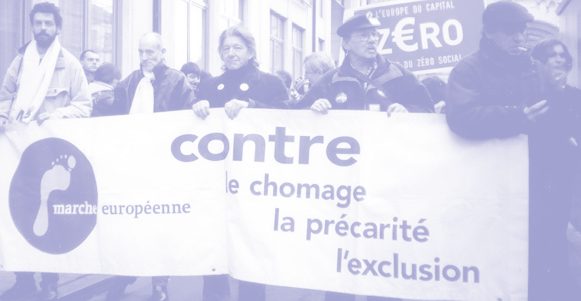 |
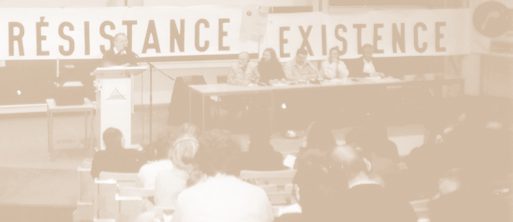 |
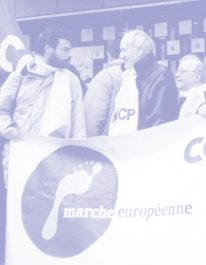 |
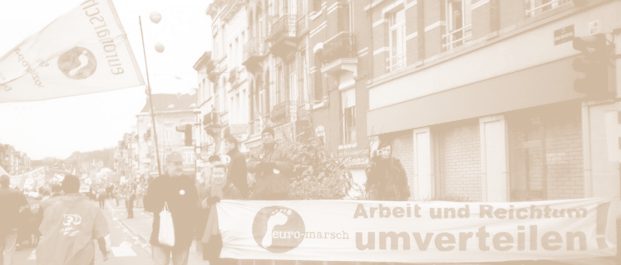 |
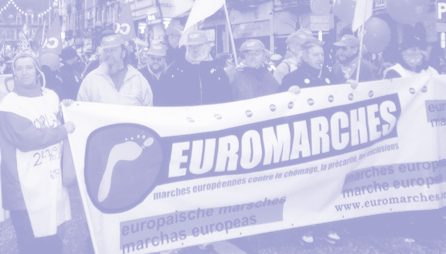 | ||
European Marches
|
||||||||||||||
| ||||||||||||||
What in the future? |
||||||||||||||
Report of the four working groupsModeration: Angela Klein (Euromarches, Germany), Patrice Spadoni (Marches Européennes, Canal Marches) Working group on immigrationJean-Louis Chesnau (APEIS), reporter; Fred Heyar (ACC, Luxembourg), moderator; Yves Martens (Collectif Solidarité contre l'exclusion, Belgium); Goumbale Ibrahima (Sin Cobas, Italy); Lara Winter (Marches Européennes, France); Luigia Pasi (Sin Cobas, Italy) We have to highlight the fact that we are going about the topic of immigration in Brussels, the place where the European Commission has its headquarters and where the Council of Ministers of the European Union meets. Here, the future of Europe, our future and our children's future is decided, most of the time without knowing it. We cannot apprehend the issues of immigration without taking into account the three other topics of the other working groups:
In the other hand, we have to take into account the global, geopolitical and macroeconomic background, in which we our analysis is centred. The issue of immigration is particularly important because it concerns everyone. It takes into account the history of people, all people, as the history of our country of origin and the one of the countries where we live, be they chosen or not. It hits our cultural, linguistic and sociocultural diversities, that are the history of humanity. Immigration hits us in a subjective and affective way, because it is not a questioning about the identity, and that whatever we think about this issue, whatever our certainties and doubts about what is good or not for migrant populations. As it was mentioned in the conference, Europe is being built, without us the unemployed nor the insecure workers, without any consultation at all with the most underprivileged, on basis which are not ours. The same is true of immigrants. In this working group, we were Belgian, Dutch, French, Italian, Italian of Senegalese origin, of Luxembourg, that means that it was not a representative panel of the 25 members' Europe. Though, we could observe common statements:
Some of us are wondering about the possible choices between action, reformism and revolution, in a background of urgency. Associations and committees of support to immigrants, we are daily confronted to the distress and the solitude of theses women, men children who cannot speak the language of the host country, who have great difficulties in expressing themselves, who have lost they traditional bearings. It is clear that immigration is integrated into the capitalist logic of employers and politicians who advocate the liberal economy. It is one more way in the human management of employment. Immigrants, who are at everybody's beck and call, are considered as a commodity like any other. They are used as a means at the disposal of a strategy leading to always more money for pension funds and the well-off and once more less share of wealth for the most underprivileged. One example among many: in Saint-Nazaire in France, the shipyards (Chantiers de l'Atlantique) hire more and more foreigners (even exclusively foreigners for some specific qualifications). For instance, Polish welders trained in the Polish shipyards that do not build any ship nowadays. They earn more than in Poland but less than French workers. Moreover, they are hired by foreign firms that do not fall under French law. Today, in Spain, in Andalusia, under paid Moroccans in farms are replaced by Romanians less stricken by local racism. In conclusion, the working group takes over on its name the Italian proposal from our friends Sin Cobas Immigrants that the European Marches should make as soon as possible a call to institutions, European and national organs in order to: defend the For an East – West solidarity of the social movements right to regularizations for all immigrants, to claim the closing of the detention centres (and to halt immediately all construction plans) where immigrants waiting to be deported are cooped up in unacceptable conditions and often victims of unbearable physical brutalities. Social rights, citizenship and constitutional issuesMichel Rousseau (Marches Européennes) reporter; Sonia Mitralias (women worldwide march) moderator; and Leo Gabriel (Euromarches, Austria) Since its birth in 1950 with the European Coal and Steel Community (ECSC), the economic and liberal Europe never stopped strengthening and structuring enlarging at the same time from six to 25 members. The social issue is quite another story. If the Council of Europe signed a Social Charter in 1961, if the ETUC was created in 1973, we had to wait the end of the century to see the beginning of a debate on the place of the social rights in EU. It took place in a background of mass unemployment and long term unemployment, of reappraisal of social gains in each country in order to « not impede competition ». An ad hoc convention was in charge to draw up a Charter of Fundamental Rights. It was proclaimed at the Nice Treaty and then integrated in the draft constitution. All the organizations think it is widely inadequate, more particularly as far as social rights are concerned for it simply ignores them. Some organizations think that it is « better than nothing », others think that nothing is better than this unacceptable text. Indeed, the labour rights, particularly the right to an income to live, does not appear. The struggle to maintain and to extend social rights on a European scale is therefore a burning issue. From the Nice summit in 2000, and then the summits of Brussels in 2001, Thessalonica in 2003, on the occasion of the European Social Forums in Florence and Paris, some networks like the European Marches, Transform, the leagues of the Human Rights met in order to compare their analysis and expectations in the fields of For an East – West solidarity of the social movements social and fundamental rights on the European Continent. Thus, at the end of 2003, we created the Network for a Democratic and Social Europe « for a democratic Europe, of citizenship, of social rights, of equality and peace » (see in the appendix the summary of the work done by this network; the working group wanted to add the right to strike at European scale to this work). This network intends to participate to the debate on the draft constitutional treaty and above all to take the necessary initiatives to maintain and expand social rights in the whole Europe, in texts and in facts. All the more reason! After the fiasco of the Brussels intergovernmental conference in 2004, according to the members of the working group, the speeding-up of the schedule gives a specific importance to the process which began, making necessary a continuous vigilance and mobilization of citizens and of the people of EU. IncomeEuromarches, Belgium; Chrystelle Blanc Lanaute (AC!, France); Willi Lüpkes (Euromarches, Germany) The working group first looked into the German situation in the frame of the implementation of the Agenda 2010. The planned Schröder government reforms are akin to the analyses Euromarches have been doing for years on the Broad Economic Policy Guidelines (BEPG), and on the employment guidelines negotiated by the national governments and the European Commission. The German Agenda intends to merge unemployment benefits, which traditionally are under the social insurance regime with the assistance regime. The amount of the benefits has been reviewed downward. The new regulation imposes on unemployed to accept any proposal of job, whatever the income conditions (including after one year of unemployment, if the proposed job salary is lower than the salary negotiated by trade unions in collective labour agreements) and whatever the qualification of the person concerned. That takes place more widely in a context of deterioration of employment, with an increase of redundancies that employers are trying to make easier and a boom in fixedterm contracts. Care services are on the way to increased privatization, retirement age has been raised and a cut has been made in pensions meanwhile tax relief on big incomes increase. The current situation in Germany is close to the one of other countries, as the members of the working group noticed: poverty is increasing, having a job does not protect anymore the workers and the unemployed are forced to accept very low paid and insecure jobs in order to keep their entitlement to low benefits. From this statement, discussions were about the minimum income, the minimum wage, and the minimum amount unemployment benefit should reach. The conclusion issued from the members of the working group is that it is necessary to make the difference between minimum income and minimum wage in analysis and stances. It is though indispensable to keep in mind that these two sources of income, to which we must add unemployment benefits, are connected. Thus, employers, the European Commission, and national governments agree to strongly reduce (or sometimes abolish) the level unemployment benefits in order to have the level of wages lowered. Unemployed are thus directly concerned by the issue of the minimum wage, traditionally handled by trade unions, so it is for workers and trade unions who must get involved in the defence of a high level unemployment benefit and minimum income. The question is then the question of the demand we should put forward. Looking at the diversity of the situations in Europe, the European Marches have proposed for several years to define the amount of unemployment benefits and those of the minimum income to demand in relation with a percentage of GDP in each State. The figure of 50% of GDP per inhabitant was suggested to value the minimum income to which every inhabitant in EU deprived of income should be entitled to. The participants discussed this amount and agreed to pursue their comparison of the national situations in order to know if this claim remains the most adequate to national realities. The aim of the working group is clear: the definition of a widely applicable demand is a priority as far as minimum income and unemployment benefits are concerned in order to stop the impoverishment of the unemployed and to protect workers by preventing new wages cuts. European EnlargementJacques Desideri (AC! France), reporter; Christian Köpcke (Euromarches, Germany), moderator; Franck Slegers (Euromarches, Belgium) Enlargement. Christian Köpcke situates the importance of this opening for Germany and particularly the regions on borders. Standards of living are different, living conditions in the East continue to get worse and corruption is expanding (in Poland, one has to pay the job centre to get a job!) In the East, enlargement is seen as a way to expand the market, to make people work for a lesser wage and to delocalize. The question of supporting Eastern unemployed organizations still remains: developing cooperation, exchanges, know-how and experiences, the mutual knowledge. In Germany, we discussed a lot the enlargement and its consequences. We start to know each other, to be enriched with our differences. Eastern situation. The Polish leaders of unemployed organizations mention the future: most part of Polish people expect positive effects with the entrance to Europe, particularly the youth. In Pomerania, unemployed organizations have been existing for eleven years, it is the result of a social revolt which took place with the increase of unemployment to 28% and the occupation of official administrations. The Committee for the defence of the unemployed was then created as a declared association. They came to France to get some contacts and to talk about the Polish reality which is not the official reality. Poland and Eastern European countries made the choice to open to the West but contacts were practically closed with the East (agreements with Russia must though be respected). Maybe Poland could have been a neutral country, self sufficient in the economic field. Illegal, undeclared, informal work is important. There are also hidden unemployed people. Our fears, our proposals. For the French (and others), there are two major risks: the delocalization of firms (with redundancies) and the arrival of workers coming from the East who accept very unfavourable conditions. As we can see, Spanish lorry drivers are exploited (with the lowering of working hours, working conditions and wages) and take the place of French lorry drivers. We must work out alternatives responses and have proposals. For instance, the labour code must be respected everywhere, the harmonization of wages and working condition must guarantee both Eastern and Western workers. We must break pictures, break the fear, struggle against xenophobia, build common power struggle. As far as the minimum income is concerned, 50% of GDP per inhabitant is worth about 400 euros meanwhile the average wage is worth 400 euros and the minimum wage 200 euros. But prices continue to grow and inflation is very strong. We thought about a tax on machines and not only on wages, in order to tax firms who make profits and hire very few workers. We have to highlight two leads: residence citizenship and the same social rights for all, and to lay stress on social rights (civil and politic rights are not sufficient). We want jobs for all, more and better jobs, qualifying training that should be adapted for all. We want to struggle against all forms of precariousness, fixed-term contract, part-time... Social rights must be engraved in the European Constitution. Building struggles all over Europe? The European Marches have managed to build a common demand on the issue of income: a guaranteed income that should not be lower than 50% of GDP per inhabitant. We have implemented European common action days, the 30th of October is the income day like the May day: the same day, the same demands all over Europe. We plan to organize common demonstrations at the borders the 1st of May. In Dublin, a European demonstration with delegates from everywhere will take place. We all have a great work to do to inform and explain our actions. We can develop twinning between our organizations. What means? To develop exchanges, to meet, to develop struggles, all this has a cost and we have very few means to make social rights improve in Europe. Could we implement a European subscription to support the struggles of the unemployed? That would allow us to raise money and get recognition. Unemployment organizations today have neither financial means nor recognition. Though, in Ireland, unemployed organizations are recognized and are full social partners. Relations with trade unions. Workers and unemployed are represented by different organizations, can a worker's union take into account the problems of the unemployed. Workers have been divided between those who have a job and those who are deprived of job. In Germany, there is a beginning of collaboration between workers and unemployed organizations, as seen in the demonstrations in the 3rd of April. In Poland, trade unions remain too politicized and have very little presence in private firms. Unemployed organizations are not supported at all by trade unions who did not do or say anything when unemployment benefits have been lowered. Today, unemployed are jealous of workers and are treated as layabouts or tramps... If we want to progress and build a power struggle in our favour for more social justice and less inequalities and exclusion, workers and unemployed will have no choice but getting allies, For an East – West solidarity of the social movements their organizations (trade unions and associations) will have to work together. |
||||||||||||||
|
<< Common social rights to every resident in the European Union << Women and precariousness in Spain << A European and misogynistic constitutional treaty which usurps women's conquests << LISBON AGENDA: More and Better Jobs? 
02/08/04
|
||||||||||||||